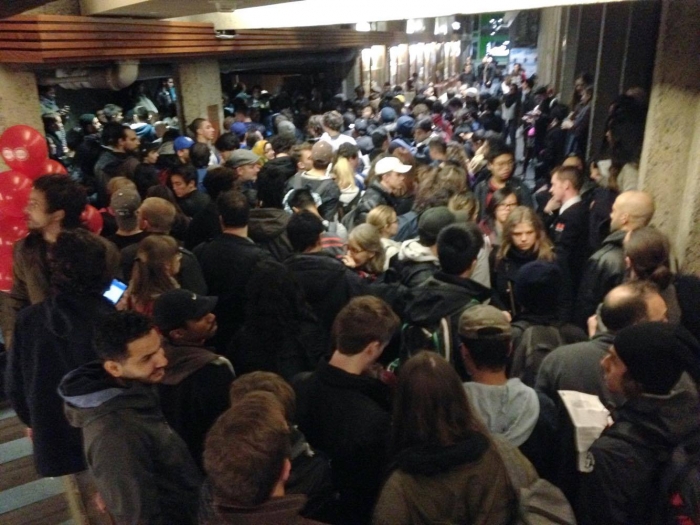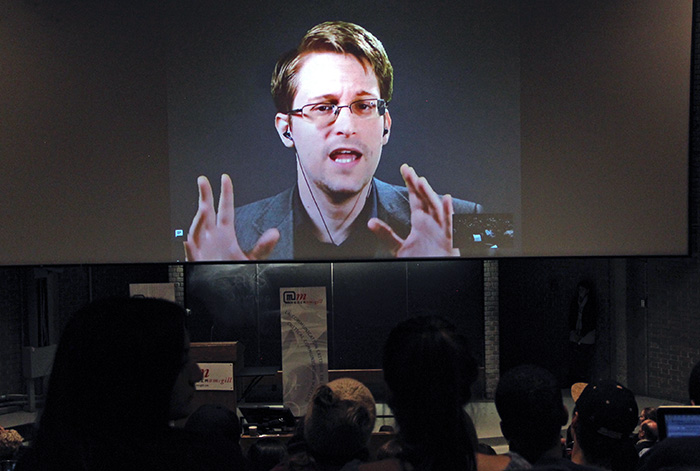The Nov. 2 live video lecture of Edward Snowden—the famous whistleblower who leaked NSA documents on mass government surveillance—was eagerly anticipated by many at McGill and within the Greater Montreal community. However, few were expecting a mosh pit of students trying to force their way into the lecture, nor the Association of McGill University Support Employees (AMUSE) picketing the event.
Snowden's presentation and live-chat were just as I had imagined: Insightful, eloquent, and inspiring. The content of Snowden’s lecture—his revelations, Bill C-51, and the attack on journalism in Canada—was not particularly unexpected. Instead, I was caught off guard by the ironic disjuncture between the students who waited for hours to hear Snowden talk about civil liberties and free expression, while dismissing—and in some cases, verbally harassing—AMUSE protesters who were peacefully exercising the very rights for which Snowden advocates. Snowden made it clear that our generation must uphold the human right to free expression. McGill students should take Snowden’s message and apply it to our university.
AMUSE is a labour union that represents around 1,500 casual and temporary employees at McGill. AMUSE members have been working under an expired collective agreement since April 2015 and are protesting the university’s inaction in securing a new agreement for their union. AMUSE’s requests include that its members receive a minimum wage of $15/hour, paid sick days, as well as access to health, dental, disability, and parental leave benefits. During the lineup for Snowden, AMUSE members handed out fliers which claimed that their labour union was not trying to dismiss Snowden’s work in their strike.
Understandably, many students who queued for Snowden were frustrated by the unorganized lineup of around 5,000 people, the prospect that they would not make it into the lecture hall, and the inconveniences of a picket line. Students unleashed their frustrations by yelling at AMUSE to leave, ripping up the fliers that AMUSE was handing out, and screaming obscenities at AMUSE protesters. However, these reactions were neither productive nor democratic. Unbeknownst to many, AMUSE was not actually blocking the entrance to Leacock—its protestors were just delaying entry into the building to make sure that those who were entering knew about their strike.

Some criticism was justified: AMUSE could have chosen to picket another event that was less chaotic than the Snowden talk, or it could have conducted its strike without causing as much interference or delay. Yet, regardless of whatever stance individuals took on AMUSE, the protesters had just as much right as the next person to be in that lineup. The event occurred at McGill, which is the workplace of AMUSE members and falls within the jurisdiction of its strike.
Snowden’s message supports the right of workers to voice their discontent. Whether or not one sides with AMUSE, students should stand by its right to demand change from the university. In fact, Snowden began his speech by addressing AMUSE’s picketing to ask the audience to try to understand the motives behind their strike, rather than jumping to criticize it.
“I understand there’s a strike, which caused a lot of trouble,” Snowden said. “[Don’t] hold that against the protestors. We need to remember that this is what happens in a democracy. We have inconveniences […] these are not weaknesses, but a strength. Although these individuals may have caused difficulty, it was for something that they must believe in strongly.”
Everyone in the audience clapped when he said that, despite booing AMUSE just minutes earlier.
By picketing the Snowden event, which was within AMUSE’s jurisdiction, protesters were democratically—albeit inconveniently—expressing their frustration with the university administration. Instead of trying to stifle the voice of AMUSE, students should have respected the integrity of its strike, or, at the very least, let the protesters speak freely about their cause.







